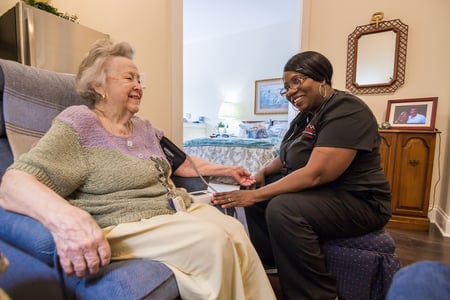%20(1).jpg?width=1200&name=BM_Water%20in%20kitchen%20(1)%20(1).jpg)
With summer in full swing, it’s more important than ever for people of all ages to stay hydrated. Between increased temperatures and more outdoor activities, summer can cause dehydration in anyone. Seniors, however, are at particularly high risk.
At Brickmont Assisted Living, we understand that thinking about hydration is not usually a priority, and can sometimes be overlooked. We’re providing some information on the importance of staying hydrated and some strategies for staying hydrated during the summer months and beyond!
Why hydration is Important for Seniors
Everyone knows the feeling of thirst: you’ve been standing in the sun too long or just finished exercising, and all you can think about is a cool drink of water. Did you know, though, that as we age, we lose our sense of thirst? That parched feeling diminishes, which means your body could be low on fluids, but you wouldn’t realize it because you don’t feel thirsty.
Because of this, seniors usually do not drink enough liquids. By the time you do feel thirsty, it could already be an early indication of dehydration. This is why so many older adults are hospitalized for complications related to dehydration.
Aside from not feeling the need to drink, there are other reasons why staying hydrated is so important for seniors. Throughout your life, your kidneys are able to balance the fluid levels in your body. Unfortunately, our kidneys’ efficiency can decline with age, meaning you are unable to retain necessary fluids—making you more susceptible to dehydration.
Eating less food also means intaking fewer liquids. Certain medications, such as diuretics, can lead to frequent urination, and other conditions, such as dementia and incontinence, can result in not taking in enough liquids. Whatever the reason, dehydration can be a serious threat to older adults.
As it is often overlooked, it's important to understand the signs of being dehydrated.
Signs and Symptoms of Dehydration
Since thirst is not always an indicator, it’s necessary to know the warning signs of dehydration and pay close attention to how you’re feeling. Initial symptoms of dehydration can include
- Headache
- Fatigue
- Muscle cramps
- Low blood pressure
- Convulsions
- Inability to urinate
If you notice any of these signs, try drinking a glass of water. If you feel better shortly after, you could have just been mildly dehydrated. Closely monitor your symptoms in case they worsen, or you are unable to retain any fluids.
.jpg?width=1200&name=BM_Water%20(1).jpg)
Tips to Stay Hydrated
The obvious way to prevent dehydration is to increase your liquid intake. It’s always a good idea to talk with your physician about your specific circumstances, but for most older adults, the recommended daily intake is between 55-64 ounces of fluid a day. However, this doesn’t necessarily mean you have to be drinking water exclusively. Here are some options to increase your fluid intake that don’t include just drinking water:
Eat more water-rich fruits and vegetables. Increasing your fluid intake doesn’t even have to include drinking. There are plenty of foods that are high in water content and can contribute to your overall hydration. Cucumbers, zucchini, lettuces, and celery are some vegetables with high water content, and watermelon, strawberries, and cantaloupe are some good options for fruit.
Enjoy a popsicle or a smoothie. These snacks are great because they not only hydrate, but they give you a healthy serving of fruits (and sometimes vegetables).
Try varieties of water. If you find it difficult to drink just water, play with different ways of enhancing the water itself. You could add some fresh fruit, an electrolyte packet, or mix it with some low-sugar fruit juice. If you prefer a more savory taste, consider drinking broth as a way to hydrate.
Buy a fun, reusable water bottle. Staying hydrated doesn’t have to mean chugging an eight-ounce glass of water every hour. In fact, it can be more beneficial for older adults to take small sips of water throughout the day. Buy a reusable mug or tumbler that you enjoy drinking out of, and try to carry it with you during the day. Having the bottle close-by will be a reminder to take small sips every so often.
Everyone should be mindful of hydration, but in general, the importance of staying hydrated becomes more vital with age. With heightened susceptibility and risk, it’s critical to understand dehydration’s warning signs and how to increase your fluid intake if you’re worried you’re not getting enough.
As always, remember that every situation is different, and you should communicate with your physician about your specific hydration needs or restrictions.




.png)